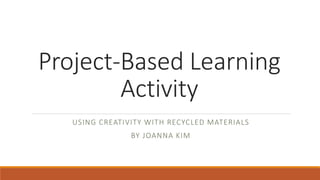
Project Based Learning Activity
- 1. Project-Based Learning Activity USING CREATIVITY WITH RECYCLED MATERIALS BY JOANNA KIM
- 2. Learning Outcomes Students will learn about the different types of materials They will learn where materials come from They will learn the different characteristics of materials Students will learn why we recycle and the importance of recycling They will brainstorm and create their own futuristic vehicle out of recycled materials They will learn the vocabulary of the materials They will apply this project to the world by encouraging their parents to recycle
- 3. Day 1: Students will be introduced to the several types of materials in the world. The main types of materials we will learn include: paper, glass, wood, concrete, metal, and plastic. Sorting Materials soft hard bumpy heavy light waterproof paper glass wood rubber cotton plastic Activity: I will bring in objects that have these materials. Students will be asked about the feature of the materials i.e., soft, hard, bumpy, smooth, heavy, light, waterproof. There will be stations and students will go around and feel the different materials. Afterwards, the students will come together and we will make a chart to sort the materials. Students will be asked to come up one-by-one to check the characteristics of the material.
- 4. Day 2: Now that we know about different materials and their features, students will be taught where the materials come from. For example, students will be asked, “Where does paper come from?” Where does glass come from? And so forth. There will be a chart with a picture of a tree for paper, sand for glass, tree for wood, sap for rubber, wild cotton for cotton, and plastic. Ask where does plastic come from? Explain that plastic is man-made and that people make it while the other materials come from nature. Activity: We will go outside and look for the materials that were discussed, such as the trees and sand. Ask them, “Can we find plastic outside?” Students will learn the difference between man- made and natural materials.
- 5. Day 3: Students will learn about recycling. What happens when we throw away paper? Why do we recycle? If we recycle what happens to those materials? For an introduction students will be shown a video of recycling and the importance of it: https://www.youtube.com/watch?v=BaFpv03hq-4 Ask critical thinking questions: 1) What happens when we throw away paper? 2) What happens to plastic bottles after we throw them in the trash? 3)Instead of throwing the materials away explain that we can recycle! 4)Students will make recycling labels for plastic, paper, and glass. They will take the labels home with a letter to parents to recycle.
- 6. Day 4: Students will be asked to bring in materials from home that are recyclable and make their own vehicles Students will be asked to create a vehicle with the materials brought it, but they won’t need to make an ordinary vehicle. They can make any type of vehicle that they can imagine. They will be shown futuristic vehicles such as the ones shown. The class will be split up into 2 groups and they will brainstorm what type of vehicle to make. They will choose what type of vehicle to make with the materials provided. After working and completing the vehicles, the students will come together and present their vehicle to each others groups by explaining what the vehicle is made out of and why they chose those materials for the vehicle.
- 7. The vehicle could look something like this:
- 8. Deeper Learning This project will provide a deeper learning of the materials that the students use everyday. They will learn that materials originate from somewhere and that materials are precious resources that we should use wisely. They will also encourage parents to recycle because of the recycling labels that they will make, making this activity have a real-world connection. They will understand that we should use resources wisely when learning about recycling. Not only will they learn vocabulary related to the materials, but they will learn the properties associated with those materials. Furthermore, students will use their creativity to make a vehicle with the materials given. This will make students collaborate together when working in groups. They will see that instead of throwing away the materials they can reuse it to make something interesting and fun!
- 9. Resources Bell, Stephanie. (2010). Project-Based Learning for the 21st Century: Skills for the Future. Retrieved from http://www.huso.buu.ac.th/file/2559/ActiveLearning/Document/10.ProjBL%20of%2021st%20cent%20s kills.pdf Trilling, Bernie & Fadel, Charles. (2009). 21st Century Skills Learning for Life in Our Times. Retrieved from https://books.google.com.vn/books?hl=en&lr=&id=VUrAvc8OB1YC&oi=fnd&pg=PR7&dq=project+based +learning+for+21st+century+learners&ots=DwaQQseqiS&sig=HZE55YqfHLVydZwf6AqirXzz- ao&redir_esc=y#v=onepage&q=project%20based%20learning%20for%2021st%20century%20learners&f =false